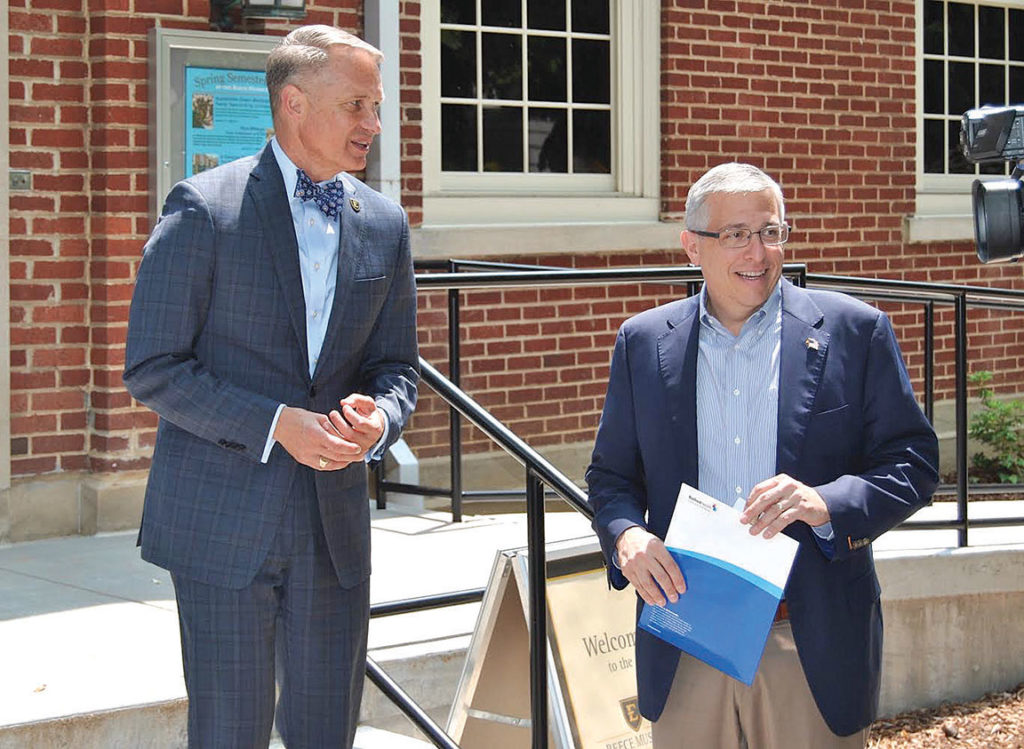
By Dave Ongie, Managing Editor
Last Thursday on the campus of East Tennessee State University, the first step was taken toward creating a pipeline to address a nursing shortage that is hampering the administration of quality healthcare both regionally and nationally.
Thursday’s meeting marked the first gathering of the Appalachian Highlands Center for Nursing Advancement, which was created in October of last year thanks to a $10 million investment by Ballad Health with the goal of uniting the region’s academic institutions together to build a robust nursing pipeline and streamline the process of nursing education.
“One of the goals of our university is to bring people together from across institutions, across the region to talk about common solutions to common problems,” said ETSU President Dr. Brian Noland. “That common problem is gaps in the workforce, particularly the nursing workforce.”
Representatives from 12 higher education institutions were represented at last Thursday’s meeting. The group included college presidents, chancellors, provosts, deans and directors.
“I think it’s critical getting everyone in the same room, and the fact you had university presidents, deans and provosts all in this room, it sort of tells you how important this problem is and all of the universities in our region see themselves as part of a solution,” said Alan Levine, CEO of Ballad Health.
Those in the healthcare industry have been aware of the potential for a nursing shortage for years. Levine cited a data point that projected a million nurses would retire between 2019 and 2032. The COVID-19 only exacerbated that shortage as nurses began to leave the profession under the strain that came along with being overwhelmed during the global pandemic.
Levine said experienced nurses can be prone to burnout, but for the first time, Ballad is seeing young nurses leaving the profession.
“There are not enough nurses,” he said. “It’s frightening for a nurse to have too many patients. It can become a problem for a nurse that becomes overwhelmed because there is not enough staff.”
“The importance of accelerating the pipeline can’t be overstated. You’ve got to get more people into the profession to help relieve the workload issues and make it safer for everybody.”
In an effort to replenish the depleted nursing ranks at an adequate pace, Levine opened last Thursday’s meeting asking higher education institutions to brainstorm and find creative ways to get registered nurses certified faster. “If it takes four years to create a nurse, that’s a problem now,” Levine said. “We don’t have four years.”
Levine favors a model that allows high school students who demonstrate aptitude to come out of high school with an associate’s degree in nursing. That degree will allow them to enter the workforce in a supporting role while they get their bachelor’s degree, which would be paid for by Ballad.
State policymakers are impressed by the model being developed by the Appalachian Highlands Center for Nursing Advancement and have matched Ballad’s initial investment. Additionally, Tennessee is viewing the new center as a model for the rest of the state.
Noland saw last Thursday’s meeting as the beginning of initiative he believes will benefit our region for years to come.
“Hopefully our conversations today will open horizons and open doors for students to see it is possible to get a wonderful job and a meaningful career right here in Northeast Tennessee,” he said. “We want to bring kids into articulated pathways from seventh, eighth and ninth grade into our institutions, have their tuition covered and give them a guaranteed job on the back end.
“That’s what we want for our kids – a chance to realize their dreams, stay here and make a difference.”



